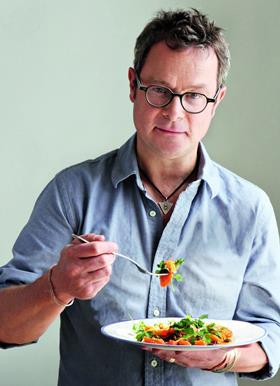
Lately, Hugh Fearnley-Whittingstall has been keen to promote a greener diet, consisting of more fruit and vegetables than viewers of his TV shows – in which he often experiments with locally-reared meat – may be accustomed.
Having penned two vegetarian books, Veg Every Day (2011) and River Cottage Veg (2013), the chef has sampled the life of a vegetarian on and off for some time, and is keen to talk about his meat-free experience.“Putting meat and fish to the side made me a more creative cook. It massively increased my repertoire of veg-only dishes,” he explains.
As well as learning himself, Hugh was keen to educate, dispelling some commonly-held beliefs about cooking vegetables. “It was so clear to me that veggie cooking is absolutely not about denial,” he points out. “The only reason that people sometimes think vegetables are boring is because they’re so used to having a plain bit of steamed veg next to a great glistening piece of meat, and in that particular competition, the meat’s going to win.”
For Fearnley-Whittingstall, vegetables require the same level of attention as their fleshier counterparts: “When you give the same love to your vegetables as you give to the roast or the piece of fish that you’re frying in a pan with a few herbs, then the flavours of the veg really take off.”
Speaking on his most recent tome, Three Good Things On A Plate, he explains his idea of a balanced diet, reflected in the book itself. “It’s got chapters on meat and fish, yes, but I should think probably 75 per cent of the recipes are vegetarian. I think that’s a fair reflection of how we should eat – we should eat more meat-free meals. Vegetables and fruit should dominate and seasonal veg should be the mainstay of a good kitchen.”
The concept of a greener diet is perhaps an easier sell to adults in a society where health and fitness are of exponentially increasing importance than to children, however Fearnley-Whittingstall gives advice on the matter from his own experiences as a father: “It’s odd, but I often find that my kids prefer veg raw to cooked,” he says. “They prefer raw carrots to cooked, they prefer baby peas straight from the pod. But kids also do like a little bit of seasoning. Garlic is a surprisingly good way of getting them into veg.”
Unsurprisingly, the chef also recommends catering for the sweet tooth when cooking veg for children, saying “the other way, kids seem to love roast veg. That slight caramelisation, if you roast veg until it gets a little bit crispy and a little bit caramelised, which emphasises the natural sugars and makes it particularly appealing for kids.”
A firm believer in locally-sourced fresh produce, Fearnley-Whittingstall insists that growing your own is something everyone can do, and even provides courses for people at the renowned River Cottage. “We have many garden courses which can give you many different skills. We do a four-day course now which gives you a garden day, a fish day, a meat day and a baking day.”
Speaking about how he does his bit, he explains the Land Share project, launched to make use of excess space for people to grow produce themselves. “A few years ago we launched the project to cut through allotment waiting lists.
“That was about people who had gardens they couldn’t look after or farmers who had spare corners of land making them available to people nearby through an online network. That’s been a greatsuccess.”
The appetite for growing your own is palpable to Fearnley-Whittingstall, who explains: “It’s clear to me that people do want to grow their own food, even if it’s herbs in your own window box. Anything that you’ve grown yourself gets you away from your sense of dependence on industrially-produced food, it just makes your cooking that much more special.”
The life of a TV chef in an age in which they are very much in vogue is a challenging one, but he has found peace in his own garden, admitting: “It’s been a great summer for growing your own. I have to admit there’s an irony and a frustration. It was slightly getting on top of me a couple of years ago.”Despite much of the filming of River Cottage taking place at his home, Fearnley-Whittingstall concedes he was afforded little time to enjoy it. “I was so busy extolling the virtues of growing your own food, going fishing, catching your own ingredients and foraging, that I wasn’t getting as much time as I wanted to do it myself,” he says. “I did lay down some rules a couple of years ago that I was going to eke out more time to be at home to look after our own garden and livestock and I’m back in a place now where I’m more involved with the garden.”
Fearnley-Whittingstall expresses frustration at his life/work balance not being in check, despite the two being integral to one another, but says he has now found a sense of stability. “It seemed a bit mad to me that the things I was passionate about and was making programmes about, I was just too busy to have time for them,” he explains. “I’m not quite the spring chicken I was. It’s important to me now, especially with a multi-aged family of late teenagers to a four-year-old, I really, really value that home time.”
Whether presenting, writing or fathering, one thing remains constant for Hugh Fearnley-Whittingstall – a commitment to food, locally sourced and, for now, mostly green in colour.